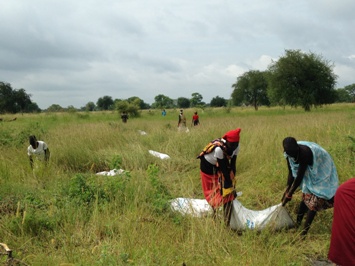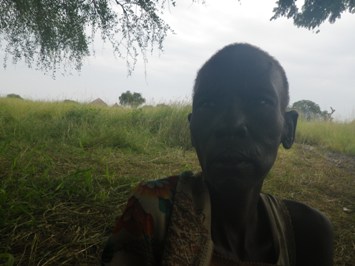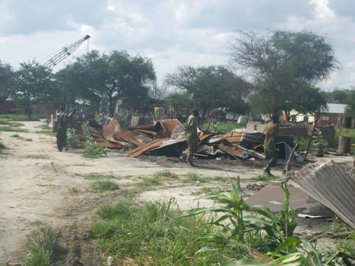Thousands facing hunger in S Sudan’s northern Jonglei
July 28, 2014 (MABIOR) – Thousands of people are living with critical food shortages and a lack of health services in the north of South Sudan’s Jonglei state.

Nyabiel Garkuoth, 69, is struggling to cope with the loss of her three sons who were killed in Gadiang in January and May after joining the ranks of rebel forces under former vice-president Riek Machar.
“My pride is no more. My sons left me in the house without any information and joined the rebels. When I asked their wives, they said they had gone for hunting and would return after a day. After two months, their clothes and shoes were brought home, that was how I came to know that they were dead,” she said.
Garkuoth previously lived in Ayod county’s Goryai before coming to Duk county’s Dorok boma (district) in to receive assistance from the World Food Programme (WFP).
MOVEMENTS MONITORED
However, she said life in the Dorok boma in western Ayod remained difficult, with rebel forces continuing to limit the movement of people in the region.
“Our movement is monitored daily by the rebels. It is hard to cross to Dinka land, looking for food [because] rebels don’t like it. Most of us moved out at night when the weather is bad,” said Garkuoth.

The fighting has pitted government troops loyal to president Salva Kiir, a Dinka, against rebels loyal to Machar, who is of Nuer ethnicity.
Nearly 4,000 households from both Ayod and Duk counties received food assistance in Ayueldit on 25 and 26 July 2014, with more expected to receive aid.
WFP is currently conducting food air drops in Ayueldit of Duk county, with oil and children’s food stuffs delivered by helicopter.
The agency has described the program as “an expensive exercise” and has cautioned the community to care for food supplies and provide regular security updates for the area.
“Only people with cattle have something to live on and the rest just suffer,” said one boy who came to a food distribution point with his mother.
TRIBES COOPERATING
Although the war has at times been interpreted as tribal war between Dinka and Nuer, the two tribes still rely heavily on one another for survival in the hunger-stricken areas.
Some Nuer families liaise with relatives and friends in the Dinka areas of Duk county to take their cattle to Twic East for sale, where they also buy food which they then deliver to relatives on the border. However, Sudan Tribune was unable to independently verify the claim.
“In my place people give some cattle to Dinka relatives for sell in Panyagor where there is money and come back with cereal, mostly sorghum,” Nyayang Dieu, a woman at her 40s, told Sudan Tribune.
She said she had been ignored by her own brothers-in-law who left her husband to fend for himself in the bush.
She has since travelled to Duk county to receive humanitarian aid at great personal risk.
“I had been suffering with children because I had nothing to eat. I took risk to come here and get it,” she said.

NO HEALTH CARE
Residents in Duk and Ayod counties have no access to health care services and have been without medications for more than seven months, although UNICEF has provided measles and polio vaccines to some children.
UNICEF has also donated drugs to the county health unit in Ayueldit to treat those suffering from malaria and other common diseases.
No schools exist in the conflict-affected areas and children remain without access to education.
While small numbers of people have cultivated maize in small parcels of land around their homes, the conflict has largely disrupted agricultural activities.
Whole villages in Duk county were destroyed during the fighting, including Payuel, Poktap, Mareng, Dongchak and Padiet, which were completely burnt, with schools and clinics also destroyed by rebel fighters in April.
(ST)
